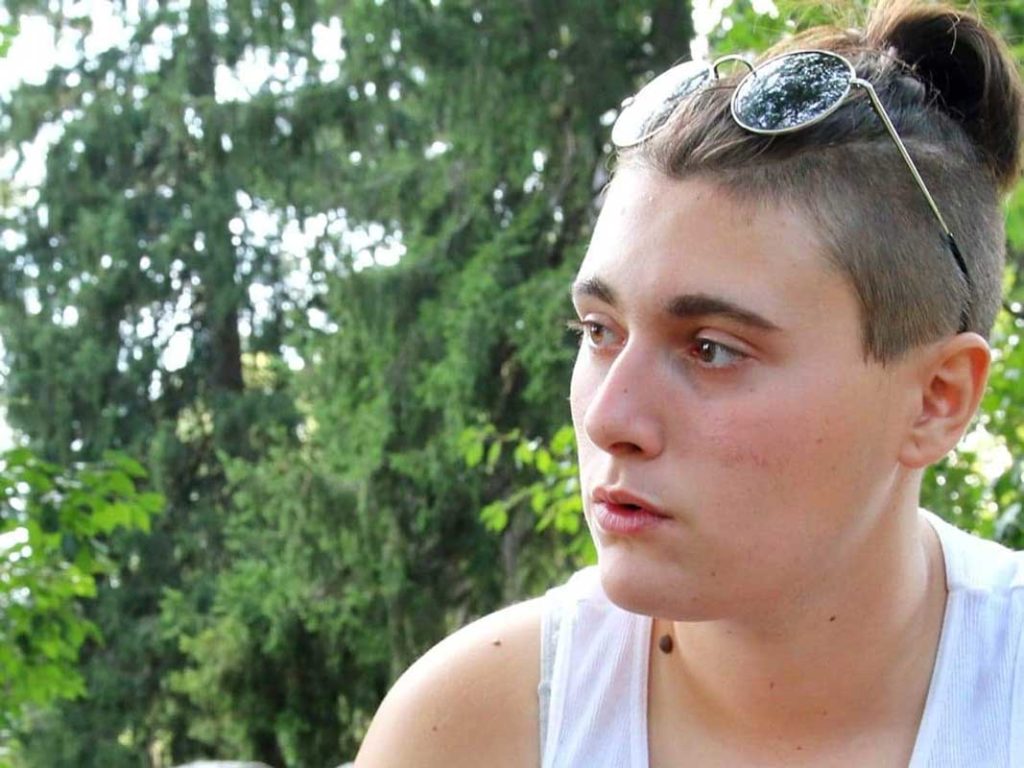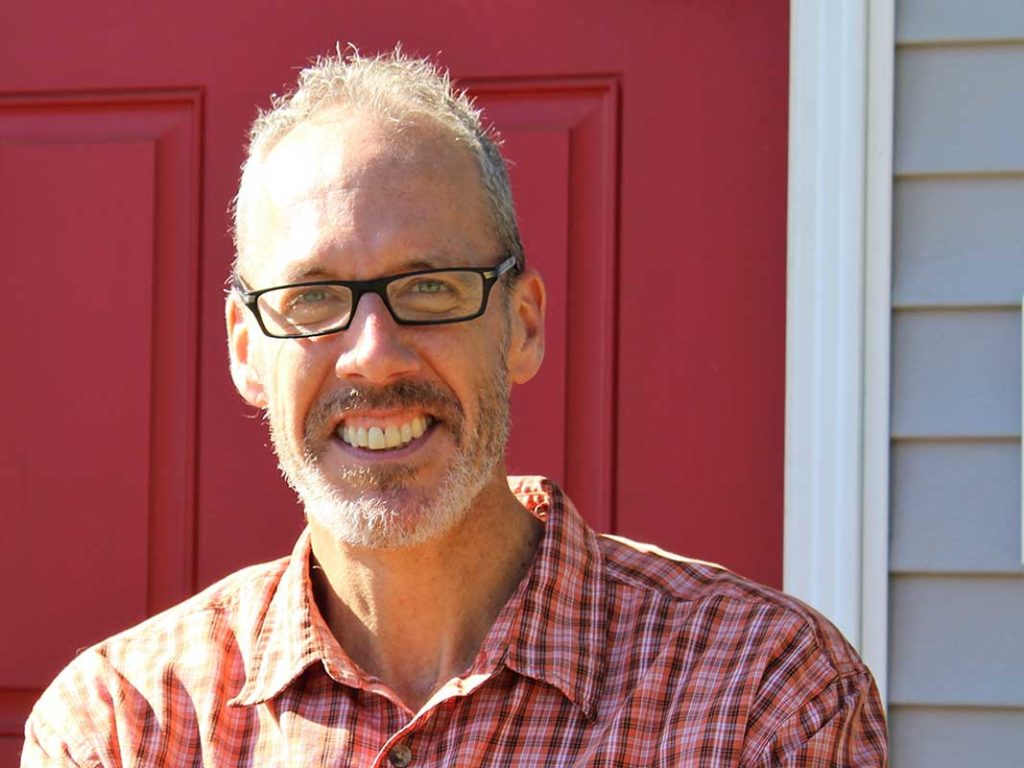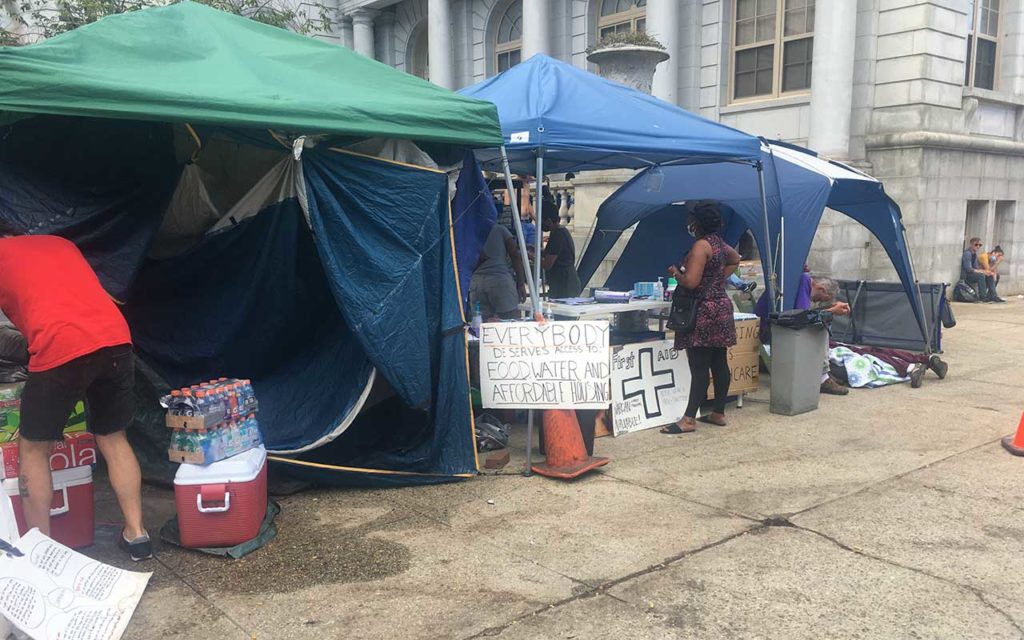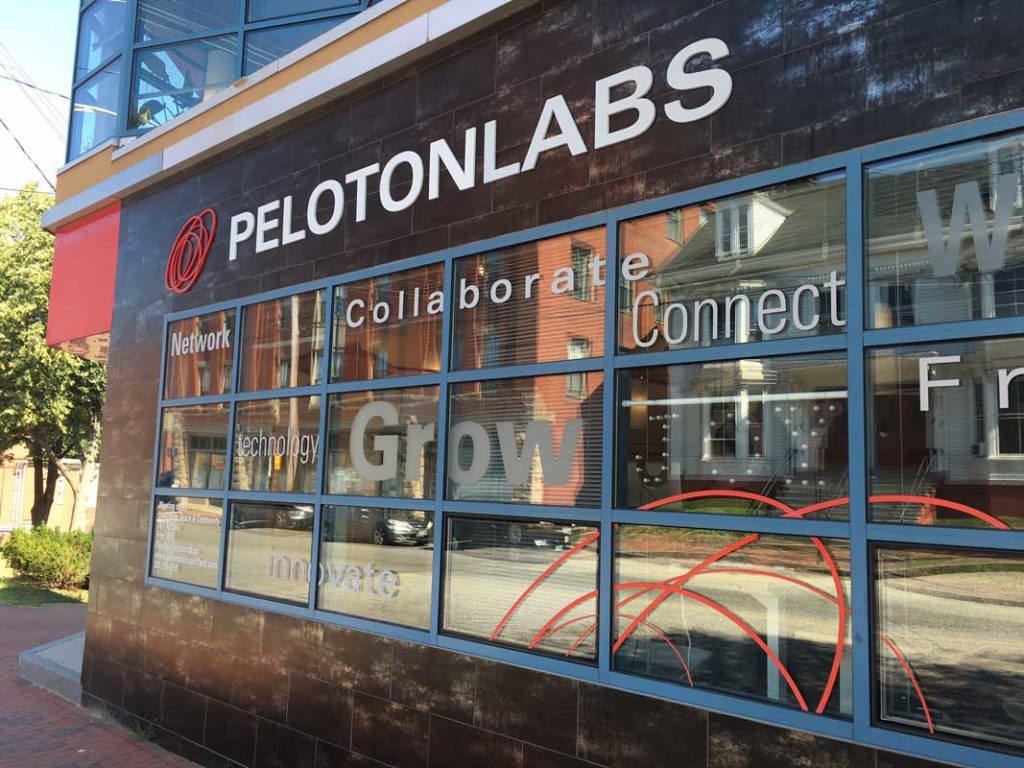
Jess Falero and Cullen Ryan talk about homelessness
Every Month Peloton Labs founder Liz Trice interviews a community member for The West End News. This month Liz caught up with Jess Falero of People’s Housing Coalition and Cullen Ryan, the Executive Director of Community Housing of Maine (CHOM). Jess has experienced homelessness, is a peer advocate, community organizer, and emerged as a leader during the recent homeless encampment at City Hall.


Cullen has a 30+ year career working with people who are homeless as a clinician, advocate, and housing developer. Community Housing of Maine is currently the largest provider for people who have experienced homelessness, focused mainly on long term stayers.
All: It’s nice to meet you finally!
Cullen: I’d love to engage as fellow advocates. We’ve housed over 250 long-term stayers in the last five years, mostly in scattered site apartments. We have a 95% retention rate… we’ve actually reduced long term homelessness by 75% in the last 5 years. We have units that become available from time to time—right now we have units in Hallowell. Also, Shalom House administers the BRAP program, and landlords are more open than usual to subsidies right now because they seem more reliable than rent from people who might lose their jobs.
Jess: Do you provide housing for people experiencing substance use disorder?
Cullen: Yes. We run the Greater Portland Addiction Collaborative Recovery Residences with Amistad. They have recovery apartments with two people per bedroom, and they provide medically assisted treatment. We expect relapse and recovery to happen and support that process. We also focus on victims of domestic violence and veterans.
Jess: Amistad is amazing. Ashish is amazing, do you know him?
Cullen: Yes, he is wonderful.
Jess: He had so many relationships with people in the encampment, he was the bridge to some great friendships. Just to clarify something you mentioned earlier, what did you mean about people being mostly in scattered apartments?

Cullen: The state is only building about 12 units per year, and about 80 people are experiencing long-term homelessness in the state right now, and all of them need supportive housing. Because of that void, we work with landlords to use rental subsidies, and then work with partners to provide support.
Jess: It’s amazing what housing plus community support will do for people. I’m curious to hear about your advocacy work.
Cullen. We have 11 staff members, and we do two things: we provide supportive housing, and we do advocacy for populations that need a voice, including people with mental illness, disabilities, and people experiencing homelessness. We focus on raising those voices on a state, local, and national level. A lot of what we do is educate folks. Today the Region 3 Homeless Council is addressing a rule from Ben Carson that will set the stage for discrimination of transgender and non-binary people. . .
Jess: . . . that’s me.
Cullen: . . . and comments are due September 22nd. There’s been outrage around the country. The Region III Homeless Council voted unanimously to sign a letter, and we’ll pursue letters from the other organizations working to end homelessness. We help people speak with one voice on these issues and carry that voice with the state and our national delegation. That’s the kind of advocacy that I do.
Jess: I’m just starting out on policy. I did a lot of work in Augusta last year, and I know that the youth I’ve been working with are feeling empowered to make a change for their communities and themselves, and that’s a beautiful opportunity.
Cullen: I encourage you to hop on the Maine Homeless Policy Committee, the Region I Homeless Council, and/or the Statewide Homeless Council. There’s always time on the local council for new topics. You’re welcome to participate in all three.
Jess: What benefits and barriers do you see for me or others I might bring in to participate in these groups?
Cullen: I don’t see any barriers if you’re able to get zoom on your phone. That said, it can sometimes be hard to reach consensus. It’s slow, relationship-building work. I’ve seen people who arrive with what they think are the right ideas but find themselves unable to gain traction right away and then give up. It’s a marathon, not a sprint, and by building relationships over time, things slowly begin to happen.
Liz: I’m curious about how many people camping out in Portland don’t have other options?
Cullen: A lot of people think they aren’t allowed in a shelter, but most are. We have fifteen organizations that are coordinating to find places to put people; if you can’t go to Florence, we look at Oxford and Milestone…
I don’t think there’s an advantage for people to stay outside; it’s difficult for people to go straight from camping to being housed. Many people have substance use disorder or persistent issues that lead to being distrustful, and it’s hard for outreach workers to engage with someone that’s on the other side of a tarp or tent because it feels like you’re intruding on someone’s private space. It’s much easier to engage people if they are in a shelter, because then you can sit at a table across from each other and talk openly.
I don’t think encampments are good for anyone, and it complicates the work of trying to end homelessness for everyone. So, I’ve been working to try to make shelters low barrier so no one is barred. Sometimes people act out . . .
Jess: …I need to point out that when you say “acting out,” that perpetuates the dangerous narrative of non-contextual bias. What that actually means is that, as a result of very real childhood trauma, these folks who have not been given resources and support react and communicate in the only way they know how. That is a perfect example of how stigma manifests.
Also, this narrative causes harm because these people are more at risk of suffering from substance use disorder. Some teens are not staying in the teen shelter because it is unsafe for them. There is racism in the shelter, as well as homophobia, and sexual harassment. That is to be expected when warehousing people in a small space is the only tangible resource available. It’s supposed to be temporary, but many times is not.
We need to address that when someone loses their job, they can be traumatized after a few months of staying at the shelter, because the shelter is not trauma-informed. It’s not deliberate, but staff doesn’t always listen to people, and that’s traumatizing. People sleep outside because they feel safer.
Having so many people with PTSD in a shelter can be intolerable for both clients and staff.
Some folks have been institutionalized in the past, and they leave the shelter because they don’t want to feel institutionalized, or are working to heal that past by being free to move in and out of the shelter; they have every right to autonomy.
Staff do awful things that go unaddressed, and that makes people feel unsafe.
So shelters aren’t always the answer.
I spoke with someone who had been housed for six months, but still slept on their porch because being inside is triggering. I’d like to bring these things to the policy conversation.
Cullen: I’ve known people who got housed and still wanted to sleep outside, too. I second and agree with everything you’re saying. All those things ring true from what I am seeing. These are exactly the kind of stories that need to be part of the conversation. We need to not have people stuck outside for a long time, or stuck in shelters for a long time, and not just have shelters be low barrier, but to be safe, and not traumatizing.
Your voice can help shelters become safe and effective. Not all shelters or staff are aware of how they impact people.
Liz: What do you think about the proposed shelter location?
Cullen: I think it’s less important where the shelter is than to make sure that all resources are available in the same place so that people aren’t having to walk and bus all over the place to eat, sleep, and get medical care.
I preferred the Brighton Avenue location because it’s on a bus location and has other things around there. We give privacy to people who have health care needs, and I think we ought to give the same thing to people who are experiencing homelessness. It doesn’t need to be on display or part of your identity.
Jess: I agree that a location with wraparound services is good but have mixed feelings about having it out of view versus being public.
Cullen: Homelessness is a symptom of failures of our mental health and health care system. We have a lot to straighten out. I look forward to having you as an ally. When we house people, they do better. The system doesn’t move very fast—I’ve been at this for 33 years. But your voice will help. Jess, reach out any time, I look forward to working with you.
Jess: Sounds copacetic, take care.
Resources
Maine Statewide Homeless Council: https://www.maineshc.org
Community Housing of Maine: https://www.chomhousing.org
Maine People’s Housing Coalition: https://www.facebook.com/phc.me/

PelotonLabs is a coworking space in the West End of Portland, Maine with a mission to connect and encourage people working on their own to manifest their visions without fear.





